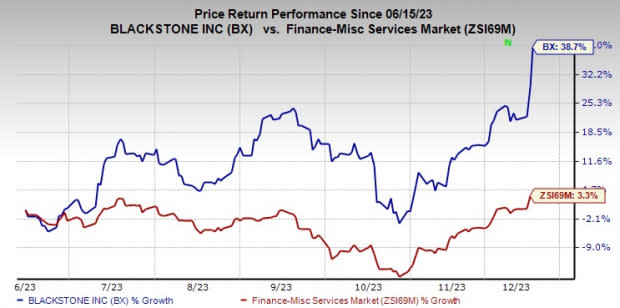Blackstone (BX), CPPIB Win Stake in Signature Bank Property Loan
A joint venture between Blackstone Inc. BX and Canada Pension Plan Investment Board (“CPPIB”) has won a stake in the $17-billion portfolio of commercial property loans from failed Signature Bank. Last month, Bloomberg reported that BX was leading to win the portfolio from the U.S. Federal Deposit Insurance Corp’s (“FDIC”) sale of Signature Bank’s debt.
Notably, following the failure of Signature Bank this March, the FDIC has been seeking to offload $33 billion of the New York lender’s real estate loans.
Signature Bank had been a big lender to apartment landlords in New York City, with a portion of loans backing buildings that have rent-stabilized or rent-controlled units. However, the rent-stabilized apartments are not part of the Blackstone deal.
The commercial property loan portfolio that has been won by Blackstone and its partners include more than 2,600 first-mortgage loans, backed by retail, market-rate apartments and office properties largely located in the New York metropolitan area.
According to a statement published yesterday, the companies are also partnering with funds affiliated with Rialto Capital to acquire a 20% stake in the venture for $1.2 billion. The FDIC continues to maintain an 80% stake in the venture and provide financing equal to 50% of the value.
Blackstone will be the lead asset manager of the portfolio, while Rialto will be the loan servicer and operating partner.
Jonathan Pollack, the global head of Blackstone Real Estate Credit, stated, “We are excited to invest in this compelling, large-scale opportunity.”
Over the past six months, BX shares have gained 38.7% compared with the industry’s 3.3% rally.

Image Source: Zacks Investment Research
Currently, BX carries a Zacks Rank #5 (Strong Sell).
You can see the complete list of today’s Zacks #1 Rank (Strong Buy) stocks here.
US Regional Banking Crisis
Toward the end of the first quarter of this year, the fastest rate hikes since the 1980s led to a crisis in the banking industry and resulted in the collapse of four banks — Silvergate Capital, Signature Bank, Silicon Valley Bank and First Republic Bank.
Following its failure, Signature Bank was closed by regulators. The FDIC took over the fallen bank and transferred all deposits and substantially all assets to Signature Bridge Bank, N.A.
Thereafter, $38 billion in assets and $36 billion of liabilities of Signature Bridge Bank was acquired by New York Community Bancorp, Inc.’s NYCB subsidiary, Flagstar Bank.
Specifically, $38 billion in assets consisted of several loan portfolios aggregating $13 billion and cash totaling $25 billion (including $2.7 billion arising from a discounted bid to net asset value). The acquired loans exclusively consisted of commercial and industrial loans.
The liabilities of $36 billion consisted of deposits of $34 billion and other liabilities of $2 billion. It also includes its core bank deposit relationships, including the New York and the West Coast private client teams.
The deal also included Signature Bank’s wealth management and broker-dealer business.
However, because of the uncertainty in the digital asset space at that time, NYCB did not acquire any digital asset banking, crypto-related assets or the fund banking business of Signature Bank. Also, NYCB did not acquire Signature Bank’s multi-family, commercial real estate and other loans.
Likewise, Silicon Valley Bank was seized by the FDIC and then sold to First Citizens BancShares, Inc. FCNCA.
FCNCA assumed Silicon Valley Bank’s assets worth $110 billion, deposits worth $56 billion and loans worth $72 billion.
First Citizens was also selected for the transaction through a competitive bidding process. It won an auction coordinated by the FDIC among 18 bidders who had put in 27 bids for Silicon Valley Bank.
The purchase of Silicon Valley Bank has been by far the biggest challenge for FCNCA, which has a history of buying failed banks.
Then, First Republic Bank, the second-biggest bank failure in history, was acquired by JPMorgan JPM. The deal made the largest U.S. bank an even bigger financial behemoth.
JPM bought the bulk of First Republic’s $228 billion of assets (adding to its huge $3.7-trillion asset balance) and assumed deposits worth $92 billion by paying $10.6 billion. The deal complements JPM’s wealth business and is expected to result in increased penetration within the high-net-worth clients. Also, JPM expected the transaction to generate more than $500 million of “incremental net income” annually.
Want the latest recommendations from Zacks Investment Research? Today, you can download 7 Best Stocks for the Next 30 Days. Click to get this free report
JPMorgan Chase & Co. (JPM) : Free Stock Analysis Report
Blackstone Inc. (BX) : Free Stock Analysis Report
First Citizens BancShares, Inc. (FCNCA) : Free Stock Analysis Report
New York Community Bancorp, Inc. (NYCB) : Free Stock Analysis Report
